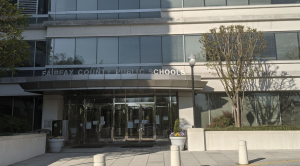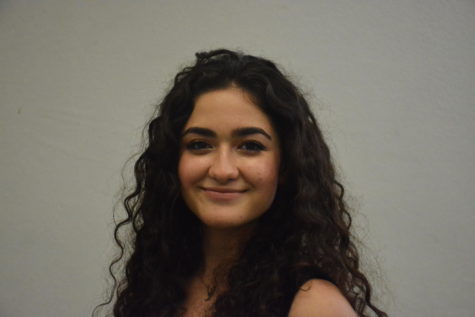FCPS calendar conflicts with Nowruz celebrations
The Karimi family set up their Haft-Sin table a couple weeks before Nowruz in 2022. “Haft-Sin” translates to “seven S,” which reflects the seven items on the table that start with S. The table is also traditionally ornamented with a mirror, candles, flowers, painted eggs, sweets and a bowl of goldfish.
March 21, 2023
To many students, March 20 may simply mark another school day or the first day of spring. However, to those of Iranic origin, March 20 marks Nowruz, commonly known as the Persian New Year, which lasts for up to 13 days.
Celebrations for Nowruz begin at the moment of vernal equinox, when days and nights become of equal length. The new year is often celebrated by surrounding oneself with family around a Haft-Sin table, an arrangement of seven items meant to symbolize the spirit of new life, and exchanging “Eidis,” or gifts in the form of money or items. Other traditions include eating Sabzi Polo ba Mahi, or herbed rice with fish, painting eggs and reciting poetry. Although celebrated predominantly by Iranians, festivities for Nowruz take place in a variety of countries and their diaspora, including Afghanistan, Azerbaijan, Kazakhstan and Tajikistan, among others, according to the United Nations.
Despite being celebrated throughout the world, Nowruz is not considered a Religious and Cultural Observance Day in Fairfax County Public Schools (FCPS), a day created to allow students to miss school in order to celebrate observances that are not already school holidays. In order for holidays to be considered a Religious and Cultural Observance, public schools must notice an “abnormal number of absences,” according to Patch. However, inordinate absences will not be noticed in a system that requires students to make up school work in return for missing school, especially not from a single body of students, considering the cultural cross between the different ethnicities that celebrate Nowruz.
As shown by the county website, 36.8% of FCPS students are white and 19.8% are Asian. Since students of Middle Eastern origin are often racially categorized as “white,” the Iranian makeup of the statistical information regarding FCPS demographics is unclear. Students from neighboring countries such as Afghanistan, Azerbaijan, Tajikistan and more are considered Asian. Many of those students also celebrate Nowruz and would miss the countdown if at school.
While conflicting with the current FCPS calendar, Nowruz celebrations might simply not demonstrate a need for the addition of a Religious and Cultural Observance Day. After all, the percentage of students who celebrate Nowruz is likely lower compared to those who celebrate other Religious and Cultural Observance Days, such as Bodhi Day, Orthodox Epiphany and Dia de los Muertos, considering that absences have not been abundant enough to pose a challenge to school instruction.
In addition, since the exact arrival of the vernal equinox happens at different times every year, the countdown to Nowruz might not occur during the school day. However, it can still coincide with after school activities and extracurriculars. This year, Nowruz began at 5:24 p.m. EDT on March 20, and will end on April 2.
In order to respect the interests of both students and instructors, FCPS should make Nowruz a Religious and Cultural Observance Day, not a student holiday. This way, students who celebrate Nowruz have a choice of attending school and are not overwhelmed by makeup work if they choose to spend the day with their family. Furthermore, it will not prevent teachers and non-observing students from introducing or learning new material that absent students can learn at a later date, or simply completing reinforcing schoolwork. Thus, the addition of Nowruz into the FCPS calendar will not be of harm to students or staff at public schools.






